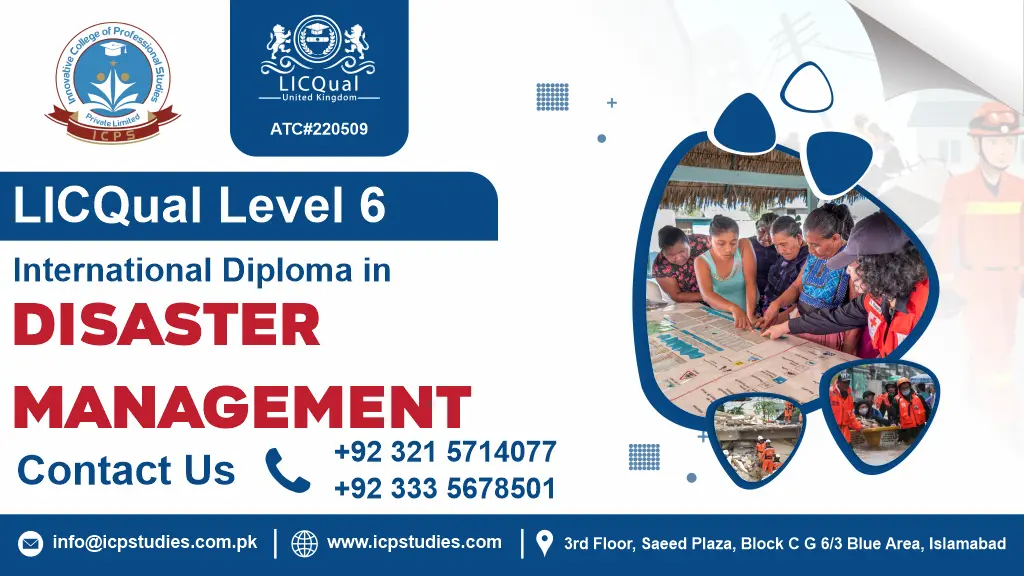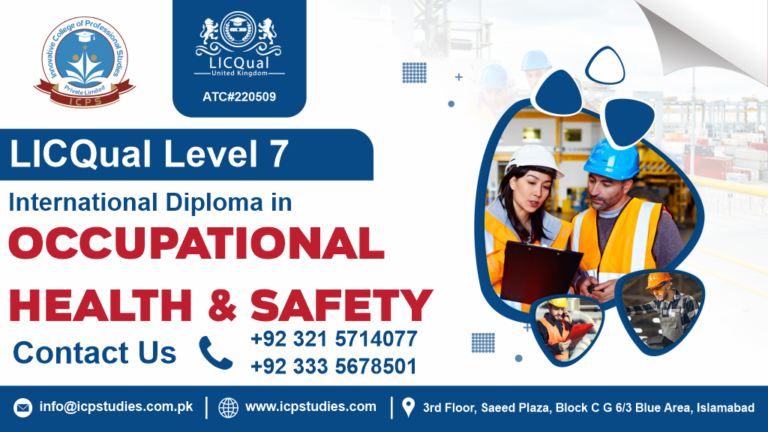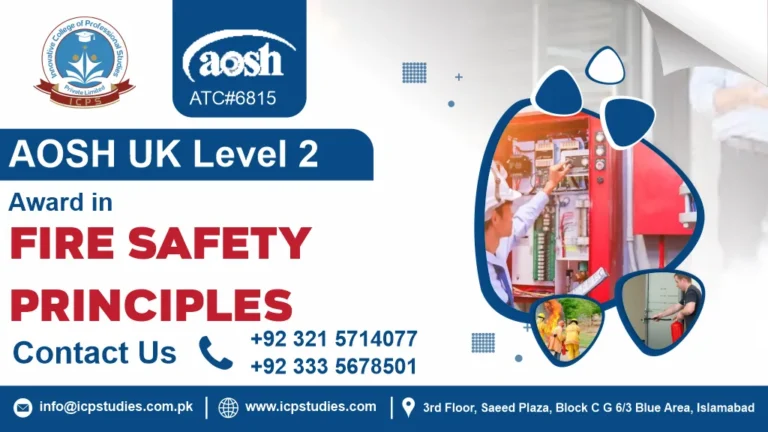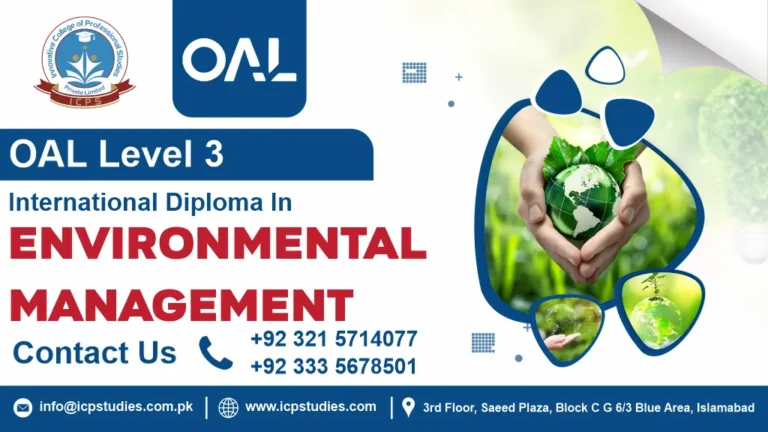Our diploma program goes beyond the basics, delving into advanced topics such as crisis leadership, risk governance, humanitarian diplomacy, climate adaptation, and innovative technologies in disaster management. You’ll gain a comprehensive understanding of the complexities of disaster response, recovery, and resilience-building in diverse contexts.
Learn from industry-leading experts and seasoned professionals who bring a wealth of real-world experience to the classroom. Benefit from their insights, practical knowledge, and guidance as you navigate complex scenarios and develop innovative solutions to pressing challenges in disaster management.
Gain a global perspective on disaster management through case studies, simulations, and collaborative projects that explore best practices and lessons learned from around the world. Develop cross-cultural competency and learn how to adapt strategies to different cultural, social, and environmental contexts.
Don’t miss out on this opportunity to take your disaster management career to new heights.. Enroll now in the Level 6 International Diploma today and unlock your potential to make a meaningful impact in disaster response, recovery, and resilience-building efforts worldwide. Together, we can build a safer, more resilient future for all.
All About Level 6 International Diploma in Disaster Management
Course Overview
The Level 6 International Diploma in Disaster Management is an advanced educational program designed for professionals who aspire to lead and innovate in the field of disaster management at an international level. This comprehensive diploma course builds upon foundational knowledge and skills acquired in lower-level qualifications, offering an in-depth exploration of complex issues, emerging trends, and strategic approaches relevant to disaster preparedness, response, recovery, and resilience-building efforts.
Participants delve into advanced theories, concepts, and frameworks in disaster management, exploring topics such as complex emergencies, climate change adaptation, conflict-related disasters, and urban resilience. They gain a deeper understanding of the interconnected nature of disasters and their multifaceted impacts on communities and societies.
The course emphasizes the development of strategic leadership and management skills essential for effectively leading disaster response and recovery efforts. Participants learn how to navigate complex challenges, make informed decisions, mobilize resources, and foster collaboration among diverse stakeholders.
Advanced risk governance and policy analysis methodologies are explored to help participants understand the political, economic, and social factors influencing disaster risk management strategies. They learn how to assess policy effectiveness, advocate for policy change, and contribute to the development of evidence-based policies and strategies.
The Level 6 International Diploma in Disaster Management equips participants with advanced knowledge, skills, and capabilities to lead and innovate in the field of disaster management. Whether you’re a seasoned professional seeking to advance your career or a newcomer looking to make a difference, this diploma course provides a solid foundation for addressing the most pressing challenges in disaster preparedness, response, recovery, and resilience-building efforts on a global scale.
Study Units
Learning Outcomes
Here are the expected outcomes for each study unit:
- Management of Natural Hazards:
- Gain a comprehensive understanding of various natural hazards, including earthquakes, floods, hurricanes, tsunamis, and droughts.
- Learn effective strategies for hazard identification, risk assessment, and mitigation measures to reduce vulnerability and enhance community resilience.
- Develop skills in developing and implementing disaster management plans tailored to specific natural hazard scenarios.
- Forecasting, Monitoring & Early Warning in Disaster Management:
- Understand the principles and techniques of forecasting and monitoring natural hazards, including meteorological, hydrological, and geological methods.
- Learn how to establish and operate early warning systems to alert communities and authorities about imminent disaster events.
- Develop proficiency in interpreting and disseminating early warning information to facilitate timely and appropriate disaster response actions.
- Research Design and Methodology in Disaster Management:
- Acquire knowledge of research design principles and methodologies relevant to disaster management studies.
- Learn how to formulate research questions, design research studies, collect and analyze data, and draw evidence-based conclusions.
- Develop critical thinking skills and ethical considerations necessary for conducting rigorous and impactful research in disaster management.
- Community Innovation and Disasters:
- Explore innovative approaches and community-based solutions to disaster preparedness, response, and recovery.
- Understand the role of local knowledge, traditional practices, and community participation in building resilience and fostering innovation.
- Learn how to facilitate community-led initiatives, promote social cohesion, and empower local stakeholders to address disaster challenges effectively.
- Decision Making in Disaster Management:
- Develop decision-making skills essential for managing complex and dynamic disaster scenarios.
- Learn how to assess risks, evaluate response options, and make informed decisions under uncertainty and time pressure.
- Understand the role of decision support systems, modeling tools, and scenario analysis in enhancing decision-making processes in disaster management.
- Crisis Management in the Twenty-First Century: “Unthinkable” Events in “Inconceivable” Contexts:
- Explore contemporary challenges and emerging trends in crisis management, including the impact of globalization, technological advancements, and socio-political changes.
- Analyze case studies of “unthinkable” events and “inconceivable” contexts, such as pandemics, cyber-attacks, terrorism, and climate-related crises.
- Develop strategies for anticipatory planning, adaptive leadership, and crisis communication to effectively manage unprecedented crises in the twenty-first century.
These outcomes collectively provide participants with a comprehensive understanding of key concepts, principles, and practices in disaster management, equipping them with the knowledge and skills needed to address the multifaceted challenges of disaster preparedness, response, recovery, and resilience-building in diverse contexts.
Admission Criteria
Here are typical entry requirements for the Level 6 International Diploma in Disaster Management:
- Educational Background:
- Applicants should hold a relevant undergraduate degree or equivalent qualification from a recognized institution. Degrees in fields such as disaster management, emergency management, public administration, geography, environmental science, social sciences, or related disciplines are often preferred.
- Work Experience:
- While not always mandatory, applicants with relevant work experience in disaster management, emergency response, public health, humanitarian aid, or related fields may be given preference. Typically, a minimum of one to two years of professional experience is desirable.
- Language Proficiency:
- Proficiency in the language of instruction (often English) is essential. Non-native English speakers may be required to demonstrate their language proficiency through standardized tests such as the TOEFL or IELTS.
- Prerequisites:
- Some institutions may require applicants to have completed specific prerequisite courses or modules related to disaster management, research methods, or relevant subject areas. These prerequisites ensure that students have foundational knowledge before enrolling in advanced-level courses.
- References or Recommendations:
- Applicants may be required to submit letters of recommendation or references from academic or professional sources attesting to their qualifications, skills, and suitability for the course. Letters of recommendation should ideally come from individuals who can speak to the applicant’s academic abilities, work experience, and potential for success in the field.
- Statement of Purpose:
- Applicants may need to submit a statement of purpose or personal statement outlining their motivation for pursuing the course, career goals, relevant experiences, and how the course aligns with their professional aspirations. This statement allows admissions committees to assess applicants’ suitability for the program and their commitment to the field of disaster management.
- Interview:
- Some institutions may conduct interviews as part of the admissions process to assess applicants’ readiness for the course, clarify their academic and professional background, and evaluate their potential contributions to the program. The interview provides an opportunity for applicants to demonstrate their communication skills, motivation, and enthusiasm for the subject matter.
Prospective applicants should carefully review the specific entry requirements outlined by the institution offering the course and ensure they meet all criteria before applying. Meeting the entry requirements helps ensure that students have the necessary background, skills, and motivation to succeed in the Level 6 International Diploma in Disaster Management.
Ideal Candidate
The Level 6 International Diploma in Disaster Management is designed for a diverse range of individuals who are passionate about making a positive impact in disaster-prone areas and communities worldwide. This course caters to professionals, practitioners, researchers, and aspiring leaders who seek to deepen their knowledge, enhance their skills, and advance their careers in the field of disaster management. Specifically, this course is ideal for:
- Experienced Disaster Management Professionals: Seasoned professionals already working in disaster management, emergency response, or related fields who wish to expand their expertise, stay updated on emerging trends, and take their careers to the next level.
- Government Officials and Policy Makers: Government officials, policymakers, and decision-makers involved in disaster risk reduction, emergency preparedness, and crisis management who seek to develop strategic insights and enhance their capacity to formulate effective policies and strategies.
- Humanitarian Aid Workers: Humanitarian aid workers, relief workers, and NGO professionals engaged in disaster response, recovery, and humanitarian assistance efforts who wish to deepen their understanding of best practices, improve their leadership skills, and contribute more effectively to relief operations.
- Public Health and Healthcare Professionals: Public health professionals, healthcare workers, and medical practitioners interested in disaster medicine, public health emergency preparedness, and the healthcare aspects of disaster management.
- Community Leaders and Activists: Community leaders, grassroots organizers, and activists involved in community-based disaster risk reduction, resilience-building, and advocacy initiatives who seek to empower communities, promote social inclusion, and foster sustainable development.
- Academics and Researchers: Scholars, researchers, and academics specializing in disaster studies, emergency management, public policy, social sciences, environmental studies, or related fields who wish to conduct advanced research, contribute to knowledge generation, and mentor the next generation of disaster management professionals.
- Students and Recent Graduates: Undergraduate and graduate students interested in pursuing a career in disaster management, emergency response, or humanitarian aid who seek to gain practical skills, industry insights, and networking opportunities to kickstart their careers.
- Military and First Responders: Military personnel, law enforcement officers, firefighters, paramedics, and other first responders involved in disaster response and emergency services who wish to broaden their understanding of disaster management principles, develop leadership skills, and enhance their capacity to coordinate multi-agency responses.
The Level 6 International Diploma in Disaster Management caters to a diverse audience united by a shared commitment to addressing the complex challenges posed by disasters and emergencies. Whether you are a seasoned professional looking to advance your career or a newcomer eager to make a difference, this course provides a platform for learning, collaboration, and leadership development in the critical field of disaster management.
FAQs for Level 6 International Diploma in Disaster Management







